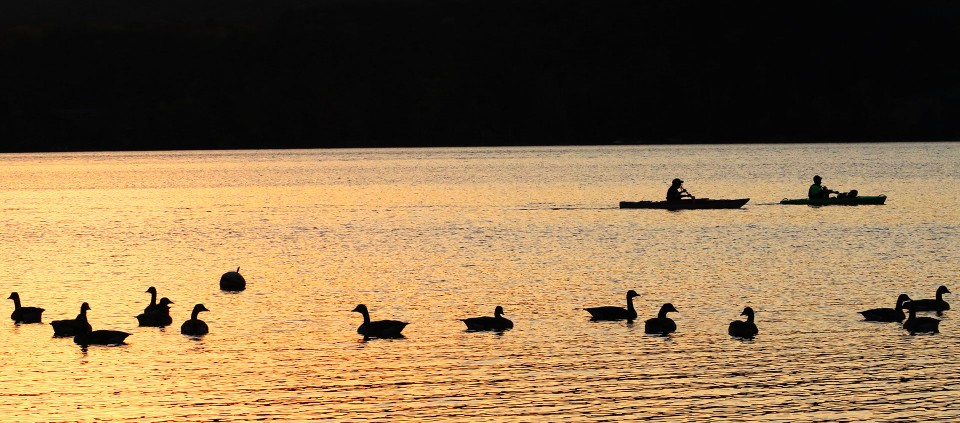Four Ways of Looking at “Wild Geese”

I was deep in Savasana when I first encountered Mary Oliver’s poetry. A wise Kripalu Yoga instructor nudged us from Corpse pose with “Wild Geese,” which begins,
You do not have to be good.
The words pierced something in me. At the time, “good” meant self-sacrificing. Unhappy in my job and in my relationship, I’d come to Kripalu to consider new choices. The poem seemed to say, You don’t have to suffer anymore.
The next day, several geese appeared on Kripalu’s front lawn, as if to reinforce Mary Oliver’s point. I left Kripalu feeling buoyed, brave. I didn’t have to be the version of “good” I’d convinced myself was admirable. I found a Mary Oliver collection and kept it close. Eventually I quit my job and moved, solo, to western Massachusetts.
I know little about Mary Oliver beyond the book jacket facts. She lives in Provincetown, Massachusetts; she won the Pulitzer Prize and the National Book Award; she’s published 29 books; she grants few interviews. Yet she continues to appear to me at apt times.
My Berkshire commute now leads me through woods and over October Mountain, the road marked with potholes and snowdrifts, depending on the season. I spot fox, deer, wild turkeys, and an occasional black bear. Still, I don’t always see the forest or the trees. My mind often races with to-dos.
To calm myself, I began to listen to an audio book, The Poetry of Self-Compassion, by poet and Kripalu presenter David Whyte. I hadn’t yet heard him speak, though I’d witnessed the enthrallment when peers described his workshops.
I pressed play and David’s emphatic Yorkshire accent pulled me in. I began to feel more aware, more appreciative, during my drive. The Berkshire landscape pulsed by as I savored his interpretations, doling out a few minutes at a time and pausing to consider the poetry he’d discussed.
I heard the words again: You do not have to be good.
Mary Oliver is a poet steeped in self-compassion, says David, and “Wild Geese” can be seen as a testament to the shadow self. When we’re self-compassionate, we can recognize the dark with the light. We don’t have to be afraid of failure or deny unsavory moments.
This interpretation makes the poem more expansive for me. David Whyte, via Mary Oliver, indirectly encouraged me to return to a long-abandoned writing project, a ghost story I’d thought too morbid and too fragmented—a failure. I didn’t have to deny the ghosts, I realized. I could give them another try.
Some time later, I traveled to Ireland with a group of musicians and music fans. I thought of David, who spoke of the poetic influence of his Irish mother. The group was called The Songbirds, and one grey afternoon, our crew of 20 assembled for tea and songs in Glanquin Farmhouse, situated among acres of farmland in the Burren, County Clare. A local priest joined us, perhaps curious about our American troupe.
We squished into the living room of our hosts, Cheryl and Patrick McCormack, and, with some encouragement, Patrick agreed to recite a poem. I expected to hear W. B. Yeats, whose writing tower we’d visited the day before, but Patrick chose an American poet.
“You do not have to be good,” he began.
That line! It seemed to follow me.
Patrick paused to say, “Every child in Ireland should learn this poem. Forgive me for saying so, Father.”
The priest laughed.
“I’ll say it again,” Patrick boomed, “You do not have to be good!”
He delivered the poem twice, turning incrementally in the close space to aim the lines at each of us. As the peat fire burned and sheep dotted the impossibly green fields beyond, the poem took on another hue: Wherever we are, whoever we are, we’re not alone. We all contain hidden longings and aspirations, whether they seem appropriate or not, sanctioned or not. Patrick underlined this commonality.
We clapped when he was through. “I’m sorry for repeating myself,” Patrick said.
I wasn’t sorry. I had the foresight to record him the second time through; I can play his version whenever I wish.
Now, at the end of my writing classes, I sometimes read “Wild Geese” aloud, though I lack the enticing Yorkshire or Irish accent. I offer Mary Oliver’s words as a call for authenticity. We don’t have to be perfect when freewriting. We can be messy on the page—and beyond.
I feel the shift in the room when I read this poem. Something unlocks in the faces of the participants, just as it did for me all those years ago. The first seven words, in particular, continue to be a mantra and a balm.
Find out about upcoming programs with David Whyte at Kripalu.
Lara Tupper writes, sings, and teaches in the Berkshires. laratupper.com
Lara Tupper, MFA, is the author of two novels, Off Island and A Thousand and One Nights, and Amphibians, a linked short story collection forthcoming in 2021.
Full Bio and Programs